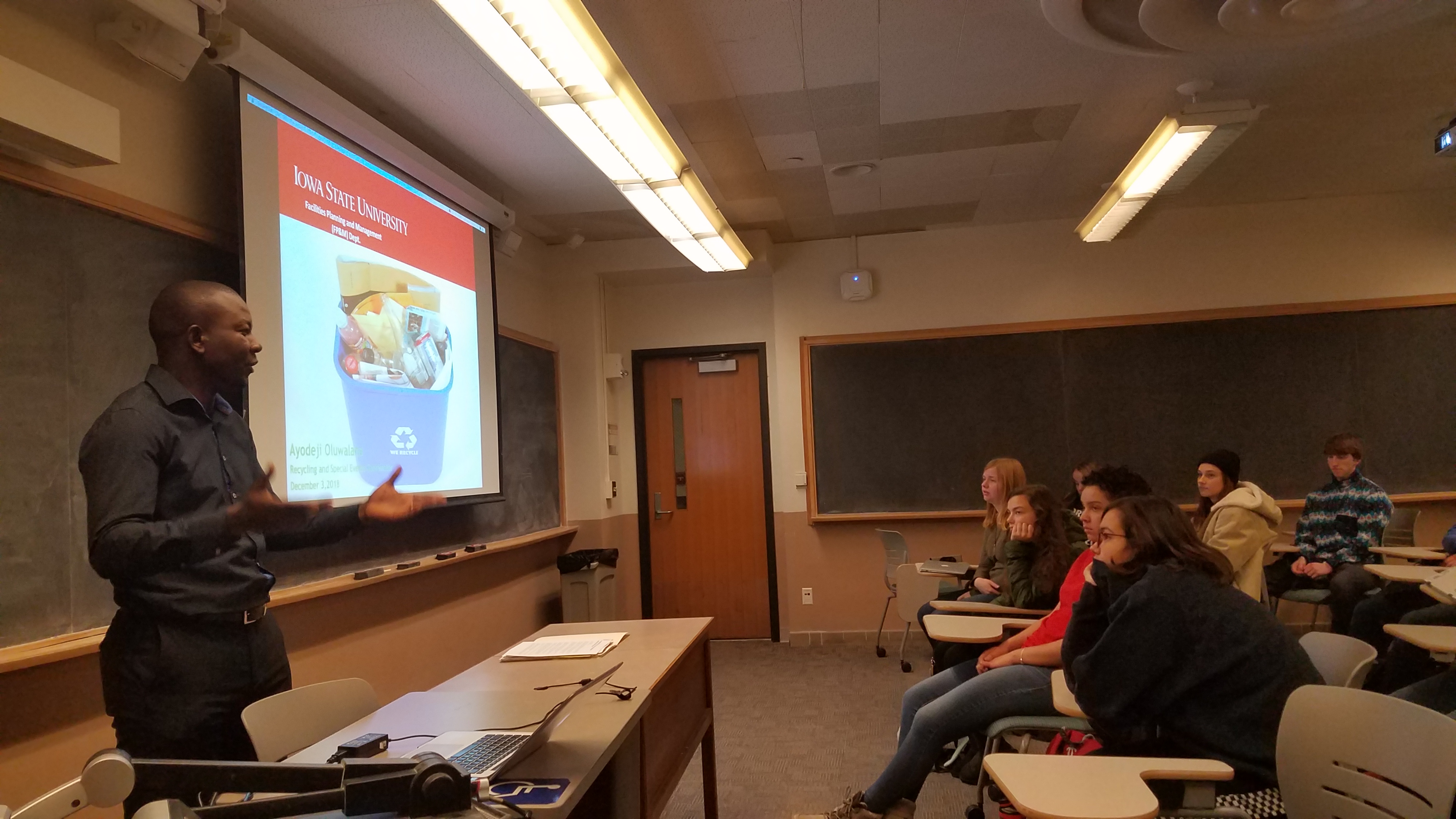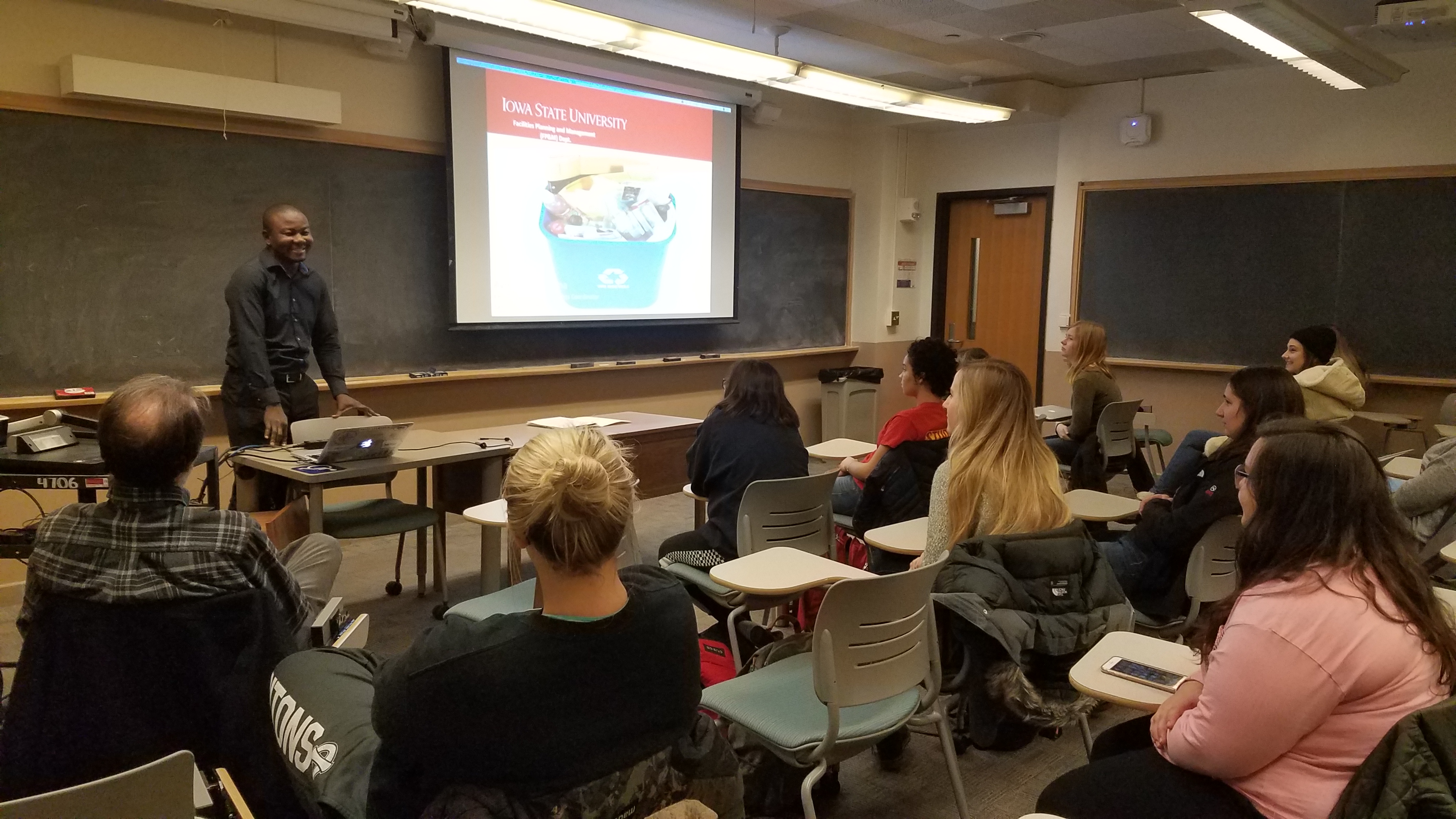Thinking Systemically for Inclusive Recycling Programs
For Ayodeji Oluwalana, it’s personal.
Since becoming Iowa State University’s first full-time staff member dedicated to campus recycling, Oluwalana has hit the ground running- retrofitting the university’s hauling contracts to save them thousands of dollars and even setting a goal for the university to divert 85% of their waste stream from the landfill by 2025. For Ayodeji, often called Ayo, it’s more than a challenge- it’s a passion.
In 2012, Oluwalana was working as a university administrator in Nigeria when historically strong floods overwhelmed the country. Because he studied environmental management & toxicology as an undergrad, he understood the damage twice over. The flood had not only damaged property and taken people’s lives, but limited waste collection infrastructure was no match for the flood and the convenience of letting waste float away from people’s homes for free. For a place without infrastructure to handle the waste of the economy, climate change accelerated the pollution even further.
“I just kind of changed my focus,” he says, reflecting on the impact of the floods. “This is something that I’m passionate about, this is something that is really happening. What can I do?”
Starting at his university in Nigeria, he developed a waste to wealth initiative and a recycling model for the school to follow. He moved to Western Colorado State University to earn a Master’s degree in Environmental Management. Although in a different environment, Ayodeji was inspired by his firsthand experience with the effects of climate change on recycling infrastructure. As a graduate sustainability mentor, he wanted to share his experiences of social justice and climate change with younger students.
“When folks are telling you that this is very important don’t just feel like, you know, they are just saying things,” he remembers telling students. “I’ve been impacted. It’s real.”
Ayodeji began working at Iowa State in 2018, and his concern for those impacted has been key to his early and quick success. While gathering information about the campus waste stream, he began to rely on key stakeholders on campus including custodial staff, procurement and the Office of Sustainability. A campus zero waste plan is scheduled to be finished by the end of the summer, but it was written by a team made up of leaders from all across campus.
“How does what we’re trying to do impact their work? How does it impact their budget?” Oluwalana explains. “You have to maintain balance and make sure people are not excluded from what you’re trying to do… That was one of the reasons why in developing our zero waste plan the approach that I adopted was to bring everybody to the table, to give everyone a voice.”
Just like those who could not afford to recycle their materials in Nigeria, Oluwalana understands that recycling must be accessible and beneficial for everyone involved in order for the program to be supported. While it is important to shake up the status quo and look for alternatives, he says, sustainability professionals must make sure that people who will be impacted by the policy can name their concerns.
“I always think of that a lot being a person of color. Whatever solution I’m bringing to the table, how do I ensure that it is inclusive? Not even to minority groups, even to people that will be impacted, whether it be people of color or whatever,” Oluwalana says. “I want to make sure that I engage people equally, give them equal tools and equal opportunity to understand what we’re trying to do.”
Moving forward in his career, Ayodeji wants to see broader changes beyond his university campus. The university is only a part of the larger system of recycling, sustainability and the world’s political economy. Oluwalana encourages holistic thinking when approaching a task like recycling to avoid isolation, identify problems, who is responsible and how to engage them. He is a board member for the Iowa Recycling Association and chairs their student membership committee. It goes to show how Oluwalana is not interested in settling for change at the university level- that doesn’t match his passion.
“All of the social justice issues- equality, equity, inclusion- should be factored in our work as sustainability professionals,” Oluwalana says. “Because, whatever initiative we are trying to implement has one form of systemic changes that needs to occur… and within that systemic change, what are those groups of people that that disruption will impact and how can your work accommodate such people? You are trying to solve a problem yes, but again, you need to systemically look inwards and also look at ‘okay, where are those people that this work is going to impact in one way or another’.”
Written by Eric Halvarson
This was originally shared in the May 2021 edition of News to ReUse, CURC’s bi-monthly newsletter.
To read more about Ayodeji’s work at Iowa State University, review this list of relevant media publications below:
- From boxes as bedding to dorm room bins, recycling efforts blossom
- Trial run explores composting paper towels from campus bathrooms
- FY20 gave first full picture of campus waste production
- Students Prove Passion for Composting
- Reducing, reusing are keys to limiting COVID-19 waste surge
- With first full-time coordinator, recycling set to expand
If you are interested in sharing a story from your campus for a CURC spotlight, submit an interest form here on our website.



